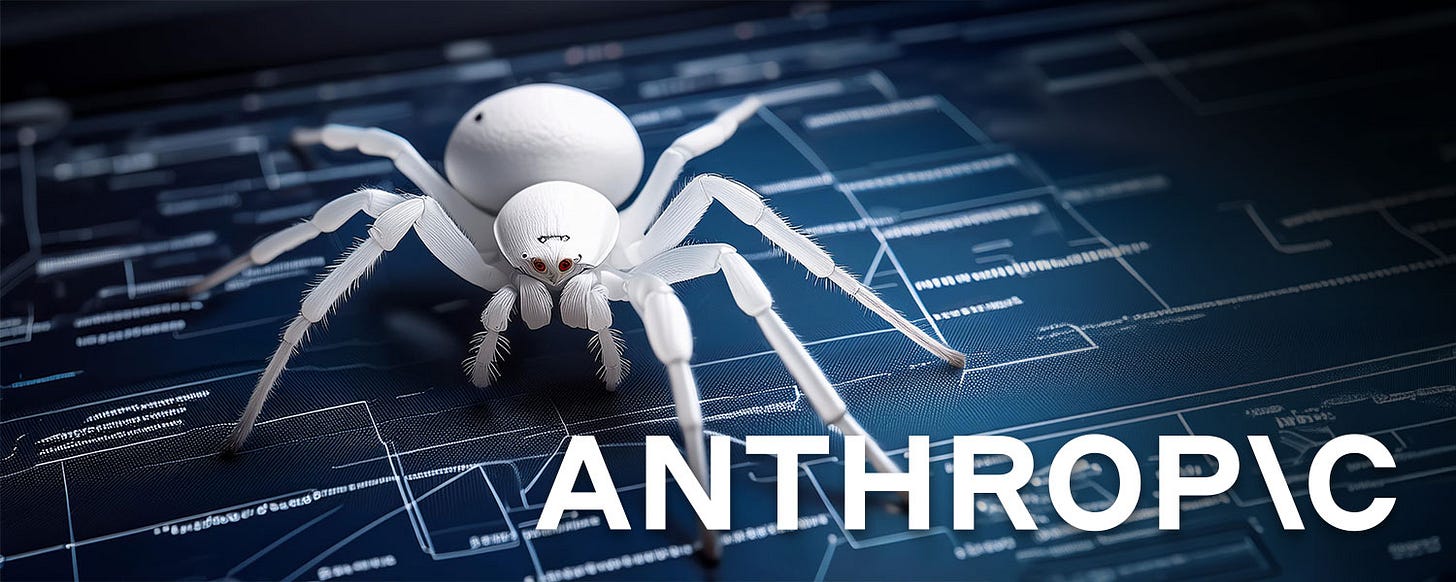Welcome to this week in AI.
This week, OpenAI released SearchGPT to compete with Google Search, Anthropic has been accused of aggressive data scraping and we look at how AI is being used in the Olympics.
Let’s get into it!
👋 If you’re new here, welcome!
Subscribe to get your AI insights every Thursday (usually).
The Search Wars Have Begun
The landscape of online search is undergoing a transformation with the emergence of AI-powered search engines like Perplexity and now OpenAI’s SearchGPT.
These innovative platforms are challenging Google's long-standing dominance by offering features such as instant summaries, personalised results, and conversational search experiences.
In addition to the new contenders, the old guard are also pivoting to generative AI features, the best known are Google’s Overviews and now Bing’s rival feature Generative search.
While AI-powered search holds immense potential to change how we access information, it also present challenges. Notably, these tools have been prone to generating inaccurate or even fabricated information.
This was evidenced by Google’s Overview feature telling users to “Eat a rock a day” or “Put glue on Pizza”, while these examples are funny, there is the potential for real harm for users who don’t understand the limitations of Gen AI.
Why it Matters
The rise of AI-powered search signifies a paradigm shift in how we interact with information online.
While the technology is still evolving, its potential impact is undeniable. For users, it promises a more intuitive, efficient, and personalised search experience.
However, the issue of accuracy and the potential impact on website traffic and revenue for publishers remain significant concerns that need to be addressed as this technology continues to develop.
A recent example is Perplexity being accused of plagiarism after it paraphrased paywalled content from publishers like Forbes and Wired, since then they launched a program to share ad revenue when publishers content is used to generate content.
The ongoing competition and innovation in the AI search market indicate that the way we search for information is set to evolve rapidly, with implications for users, businesses, and the wider digital ecosystem.
📰 Article by The Atlantic (no paywall)
Sam Altman’s Opinion - The Race for AI's Future: A Democratic Imperative
In a recent opinion piece, Sam Altman, CEO of OpenAI, argues that the United States' current lead in AI development is under threat from authoritarian regimes.
He warns of a dystopian future where AI is used for surveillance and control, emphasising the need for a democratic vision for AI to prevail.
Altman outlines four key areas where the U.S. needs to focus to secure this future:
Robust security measures
”American AI firms and industry need to craft robust security measures to ensure that our coalition maintains the lead in current and future models and enables our private sector to innovate."Investment in infrastructure
"U.S. policymakers must work with the private sector to build significantly larger quantities of the physical infrastructure—from data centers to power plants—that run the AI systems themselves."Coherent commercial diplomacy policy
"We must develop a coherent commercial diplomacy policy for AI, including clarity around how the United States intends to implement export controls and foreign investment rules for the global build-out of AI systems."International cooperation to establish norms
"We need to think creatively about new models for the world to establish norms in developing and deploying AI, with a particular focus on safety and ensuring a role for the global south and other nations who have been historically left behind."
Why it Matters
Altman's argument is a call to action for the U.S. and its allies to safeguard the future of AI.
He stresses the importance of AI as "the foundation of a new industrial base" and highlights the potential consequences of inaction:
"If they manage to take the lead on AI, they will force U.S. companies and those of other nations to share user data, leveraging the technology to develop new ways of spying on their own citizens or creating next-generation cyberweapons to use against other countries."
In Altman’s opinion, the decisions made today will determine whether AI becomes a tool for widespread progress or a weapon in the hands of a few.
The article concludes, "If we want a more democratic world, history tells us our only choice is to develop an AI strategy that will help create it, and that the nations and technologists who have a lead have a responsibility to make that choice—now."
📝 Opinion piece in The Washington Post (no paywall)
Anthropic's AI Ambitions Fuel Aggressive Data Scraping
AI startup Anthropic, known for its "responsible" AI development ethos, is facing accusations of aggressive data scraping from websites to train its models.
This practice, while not new in the AI industry, has intensified due to the ongoing AI arms race.
Websites like Freelancer.com and iFixit have reported millions of hits from Anthropic's web crawler, this breaches their terms of service and creates a financial burden on site owners.
Anthropic claims to respect website protocols, such as the 'robots.txt' file, which instructs crawlers on which parts of a site to avoid, and anti-circumvention technologies like CAPTCHAs.
However, critics argue that the company's actions demonstrate a disregard for website owners' wishes and the ethical implications of data scraping.
Why it Matters
This controversy sheds light on a widespread practice in the AI industry. Data scraping, while not unique to Anthropic, has intensified due to the escalating AI arms race.
As companies strive to develop more sophisticated AI models, the demand for data has surged, leading to increased scraping activities across the web.
This raises questions about fair use, copyright, and the ethical implications of using others' content without permission.
While Anthropic asserts that their "crawling should not be intrusive or disruptive," the sheer volume of their activity and allegations of ignoring requests to stop scraping paint a different picture.
This issue highlights the need for clearer guidelines and regulations around data scraping to protect website owners' rights and ensure ethical AI development practices.
📰 Article by the Financial Times (no paywall)
Musk's Data-Hungry Grok
Elon Musk's X platform is facing scrutiny from data regulators and privacy advocates over its practice of using user data to train its Grok AI model by default.
This move, which may breach privacy laws in Australia, the UK, and the EU, has triggered concerns about the lack of transparency and user consent.
X's data harvesting practices are not unique, as we’ve just seen with the above story about Anthropic’s aggressive data scraping.
Why it Matters
The controversy surrounding X's data harvesting is part of Elon Musk’s overarching ambitions to be the leader in AI.
His company XAI just built the worlds largest training cluster which is powered by 100,000 liquid-cooled NVIDIA H100 GPUs. In addition to that, he is also in discussion with Tesla to invest an extra 5 billion dollars into XAI.
While the use of data to train AI models is crucial for their development, the lack of transparency and user control over how their data is very problematic.
If you haven’t already, you can opt out of sharing your data on X website (unavailable in app).
📰 Article by Windows Central on XAI: Worlds largest training cluster
📰 Article by ABC on breach of privacy law
📰 Article by The Guardian about data harvesting
DeepMind's AI System Wins Silver in International Math Olympiad
In a huge achievement, DeepMind's AI systems, AlphaProof and AlphaGeometry 2, have demonstrated a silver-medal level of mathematical reasoning by solving four out of six problems at the 2024 International Mathematical Olympiad (IMO).
This marks the first time AI has reached such a high level in this prestigious competition, often seen as the "premier math competition for the world's brightest mathletes."
Why it Matters
This milestone signifies a "phase transition" in the use of AI in mathematics, showcasing the potential of AI to tackle complex problems that were once thought to be the exclusive domain of human intellect.
Dr. Silver, who is Google DeepMind’s vice-president of reinforcement learning said “The fact that we’ve reached this threshold, where it’s even possible to tackle these problems at all, is what represents a step-change in the history of mathematics”.
This achievement could lead to AI tools that assist mathematicians in exploring hypotheses, speeding up research, and making mathematics more accessible to a wider audience.
The potential for AI to not only solve problems that humans can, but also "maybe even one day go beyond those," as suggested by David Silver, a research scientist at DeepMind, is a thrilling prospect for the future of mathematics.
📰 Article in the New York Times (no paywall)
📝 DeepMind's blog post on the new models
Paris 2024: AI Takes Centre Stage
Video length: 1:58:40
The Paris 2024 Olympics are set to be a technological showcase, with AI playing a leading role in transforming various aspects of the Games. Here are some of the key AI technologies and their uses:
Enhancing Performance and Experience
3D Athlete Tracking: Analyses athletes' movements, providing real-time feedback to enhance techniques and optimise performance.
AI-Powered Judging Assistance: Offers precise data on athlete performances to ensure fair and unbiased scoring.
AI-Enhanced Fan Experience: Delivers in-depth insights and immersive experiences, allowing fans to compare their skills with other Olympians.
Ensuring Safety & Sustainability
Safety and Security: AI monitors social media for abusive content, creating a safer environment for athletes. An AI chatbot provides quick answers to athletes' questions.
Sustainability: AI monitors energy consumption in real-time to ensure efficient use of resources and reduce environmental impact.
Other Innovative Applications
Injury Prevention and Recovery: AI analyses data from wearable devices to predict potential injuries and suggest preventive measures.
Match Prediction and Strategy Development: AI analyses historical data and performance metrics to provide insights into opponents' strengths and weaknesses, aiding in strategy development.
Sports Journalism: AI automates the generation of match reports and analysis, allowing journalists to focus on more in-depth stories.
Why it Matters
The Paris 2024 Olympics will be a showcase for how AI can transform the world of sports, making the Games more accessible, engaging, and sustainable.
Athletes will benefit from enhanced training techniques and injury prevention, while fans can enjoy a more immersive and personalised experience.
The integration of AI represents a giant leap towards a future where technology and sports seamlessly intertwine, pushing boundaries and creating an unforgettable experience.
Quick bytes
Microsoft Copilot early adopters say they need to clean up data and have extensive employee training
Miss the last one?
That’s a Wrap!
If you want to chat about what I wrote, you can reach me through LinkedIn.
If you liked it, give it a share!









